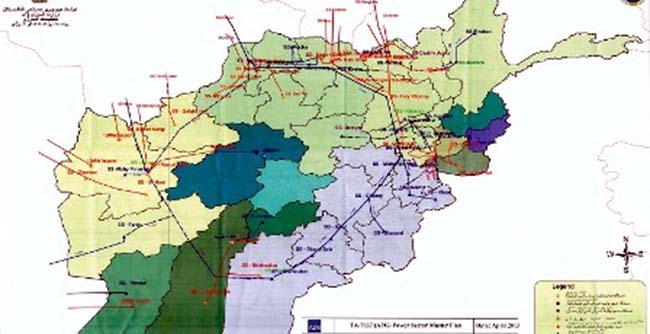In Kabul, public outcry over a recent decision by Afghan government is on the soar. Last week President Ashraf Ghani’s cabinet silently approved transmission of a 500 kV electric power line from Turkmenistan to Afghanistan via Salang Pass located in northern part of the country. However, the feasible route as recommended in studies performed by a German consulting company passes through central province of Bamyan.
Significant number of Afghan political leaders, parliamentarians and civil society activists have deemed the decision as discriminatory and have warned the government of a massive protest across the country in the coming few days if it fails to change its mind. The government has been rigid so far despite unsuccessful attempts to defend its decision.
The TUTAP Concept
Turkmenistan-Uzbekistan-Tajikistan-Afghanistan-Pakistan (TUTAP) is a concept by Asian Development Bank (ADB) aimed at promoting trade in electricity between energy-rich Central Asian countries and Afghanistan and Pakistan that face severe electric power deficit throughout the year. Under TUTAP, a 500 kV line will be transmitted from Turkmenistan first to Afghanistan and then to Pakistan.
After crossing the border into Afghanistan the transmission will connect to a sub-station in Pul-e Khumri, the center of northern Baghlan province and will then travel to the capital city of Kabul before being transferred to other parts of the country.
To reach Kabul, the line could pass either through the central province of Bamyan or Salang Pass. Which route should the line go is the current point of dispute between the government and the people.
Bamyan or Salang Pass?
In April 2013, Fichtner a consulting company based in Germany completed a 20-year power sector master plan for Afghanistan in which it highly recommended the Bamyan route. According to the master plan, “The Bamyan route will avoid the narrow space and difficulties along the Salang Pass, will allow connecting further generation by coal fired power plants along the route and will secure power supply of Kabul and south Afghanistan by using a separate route.” Meanwhile, Fichtner termed passage of the line through Salang Pass as “very difficult, if not impossible.”
There is an existing 220 kV transmission line passing through the Salang Pass. With arrival of winter, every year fear of power cuts due to avalanches in Salang Pass grows high. In 2015, an avalanche in the Pass demolished three electrical pylons that took about one and half month before they were fixed.
Additionally, this route is insecure. In January this year, the Taliban cut off lines carrying electricity from Central Asian countries to Kabul in northern Baghlan province leaving the capital in dark for weeks.
Route Change
Initially, the Bamyan route was chosen and approved by Afghan Ministry of Energy and Water (MEW). Later on, however, the route was changed on requests from Da Afghanistan Breshna Shirkat (DABS), the only company in the country that manages power supply and distribution. Critics like Assadullah Saadati who is a member of Afghan parliament says DABS representatives went to Germany and pressurized Fichtner to choose any route they want except for Bamyan.
According to DABS representatives, another waiting period of two years is required to change the route back to Bamyan. People on the other hand ask why DABS had to request for a route change in the first place.
Strong Criticism
On April 30 the transmission of 500 kV line via Salang Pass was approved in the Afghan cabinet meeting presided by Ashraf Ghani. The decision triggered anger across the country, especially among the people of Bamyan, faced with such deprivation in addition of systematic genocide for centuries now.
The Presidential Palace, DABS and MEW came under strong and immediate criticism from prominent political leaders and influential figures in the country who termed the decision as terrible and discriminatory. Former head of Afghanistan’s intelligence agency or National Directorate of Security (NDS), Rahmatullah Nabil said, “This decision and lack of clarification [about it] will not only extent deprivation of a major fraction of our countrymen that has always been deprived of national wealth and amenities but will also bring our people against one another and cause disagreement among them.”
Amrullah Saleh leader of the movement Green Trend who also led NDS from 2004 to 2010 titled his Facebook post as “Central regions are a part of Afghanistan’s territory, not a colony of the central government.” He called upon the government to treat central provinces of Bamyan, Ghor and Daikundi as the heart of Afghanistan and urged President Ashraf Ghani to fulfill the promise he had given to the people of these provinces during his election campaign. “Before elections Dr. Muhammad Ashraf Ghani, President of the country, had said he would open the closed arteries of central regions so that the heart of Afghanistan can beat warmly. Please act upon your promise.”
Fro, Attah Muhammand Noor, the influential political leader in northern Afghanistan, to prominent parliamentarians have called upon the government to change its decision.
The Enlightening Movement
Ahmad Behzad, member of lower house of the parliament who was among the first ones to break the news of TUTAP route change is now leading a recently-formed council called “People’s High Council” with other activists to stage a massive protest in Kabul. Using social media, he is also encouraging Afghan diaspora to raise their voice simultaneously and arrange protests wherever they live. “Disgrace apartheid ruling Afghanistan,” he said in a recent post on Facebook.
Activists on social media has termed this movement as “The Enlightening Movement,” the main purpose of which is to protest not only the recent decision of the government but also create awareness at the global level on the plight of Hazara people ranging from the systematic genocide to political, social and economic suppression in Afghanistan.
Home » Opinion » TUTAP Route Change
TUTAP Route Change
| Sher Ali Nader

